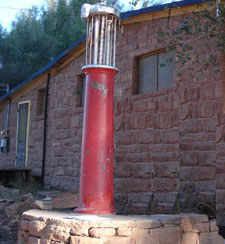Underground Storage Tanks Program in Indian Country
EPA implements the underground storage tank program in Indian country. We provide support to Tribal governments to prevent and clean up petroleum releases from USTs.
On this page:
Basic Information
EPA works to improve human health and the environment in Indian Country by working with Tribes to:
- Prevent releases from USTs
- Ensure releases are cleaned up
- Collaborate and strengthen the relationship between EPA and Tribes
The UST program in Indian country includes marketers and non-retail facilities that have USTs. Marketers include retail facilities such as gas stations and convenience stores that sell petroleum products. Non-retail facilities include those that do not sell petroleum products but may rely on their own supply of gasoline or diesel for taxis, buses, limousines, trucks, vans, boats, heavy equipment, or a wide range of other vehicles. Of the more than 570 federally recognized Tribes about 200 have federally-regulated underground storage tanks on their lands. Of those 200 Tribes, over half have 10 or fewer active underground storage tanks. About 20 Tribes have 30 or more underground storage tanks.
To learn more about EPA's Tribal programs, visit EPA's American Indian Environmental Office.
Training Resources for Managing USTs in Indian Country
Providers of Tribal UST Program Training
EPA supports Tribal UST Program training through the following organizations:
- Institute for Tribal Environmental Professionals’ (ITEP) Tribal Waste and Response Program provides training and assistance, covering areas such as brownfields, contaminated sites, hazardous materials, underground storage tanks, and emergency response programs.
- New England Interstate Water Pollution Control Commission (NEIWPCC) provides forums for information exchange and partnerships to assist Tribal and state personnel with UST leak prevention, compliance, and LUST cleanup.
Prevention Training Resources
- EPA National Enforcement Training Institute (NETI) provides online eLearning, webinars, and classroom training opportunities.
- UST Inspector Training contains two modules: Introduction to the UST program and basic UST inspector training. This revised training now includes requirements and information from the 2015 federal UST regulation.
- Training for Federal Credential Inspectors: Revised Executive Order 3500.1: Training and Development of Individuals Who Lead Compliance Inspections/Field Investigations, June 19, 2014 (PDF) (24 pp, 976 K, About PDF)
- Class A and Class B UST Operator Exams help UST system owners and operators in Indian Country meet the 2015 federal UST requirement that designated operators demonstrate knowledge and pass an exam.
Cleanup Training Resources
- The Institute for Tribal Environmental Professionals’ (ITEP)
- New England Interstate Water Pollution Control Commission (NEIWPCC)
- UST Corrective Action Training
For more information on cleaning up leaking underground storage tanks, go to Cleaning Up UST Releases.
Publications Related to Underground Storage Tanks in Indian Country
Managing Your USTs in Indian Country -- Compliance Assistance Fact Sheets based on the 2015 UST regulations
Owners and operators of USTs on Tribal lands must comply with federal UST regulations. EPA developed a series of compliance assistance fact sheets to help UST owners and operators in Indian Country comply.
Is Your Facility Ready?
EPA’s Pacific Northwest Region 10 developed a tri-fold brochure for UST facilities on Tribal lands to be a compliance assistance resource on the testing, inspection, and reporting requirements in the 2015 federal UST regulation.
Report to Congress on the UST Program in Indian Country
On August 8, 2007, EPA issued the Indian Country USTs Report to Congress, which discusses the considerable progress EPA and Tribes have made by working together to prevent and cleanup releases from USTs in Indian Country as well as the challenges remaining and work to be accomplished.
Strategy for an EPA/Tribal Partnership
EPA collaborated with its Tribal partners to develop this Tribal strategy in 2006. The Tribal strategy serves as a foundation of future tank work and collaboration between EPA and Tribes.
UST System Compatibility with Petroleum-Biofuel Blends: A Brief Guide to the 2015 Federal UST Regulations for Owners and Operators of USTs Located on Tribal Lands
This tri-fold brochure provides UST owners and operators on Tribal lands with compatibility requirements in the 2015 federal UST regulation when storing gasoline blends containing greater than 10 percent ethanol or diesel blends containing greater than 20 percent biodiesel.
For more publications on underground storage tanks visit: Publications Related to Underground Storage Tanks.

